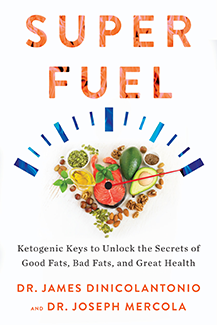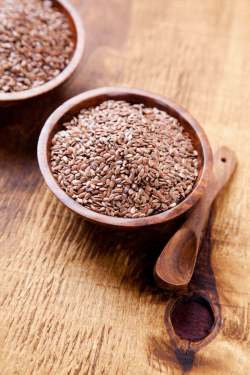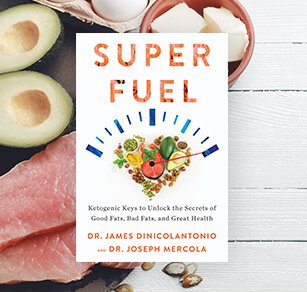Finally Revealed, the Science That’s Been Hidden and Distorted for Generations
"
Superfuel is a fascinating discussion about how much of what we’ve learned about dietary fat is completely wrong. This helps upend much of the low-fat dogma that has dominated nutritional thinking for the last 40 years. This book is a must-read if you are interested in improving your health through diet."
Jason Fung MD - Author, The Obesity Code

Order Now
Order your copy now and claim your free gifts!
My last book, Fat for Fuel, presented a novel strategy for the popular ketogenic and Paleo diets. It was aimed at helping you understand the importance of mitochondria to your overall health and how using cyclical ketogenesis could help you achieve metabolic flexibility to enable you to burn fat as your primary fuel.
In the Fat for Fuel paradigm, fat is your largest macronutrient contribution—anywhere from 50 to 85 percent of your diet, depending on where you are in your metabolic cycle. The selection of your fats is absolutely crucial to your success and your physical and mental well-being.
In writing Fat for Fuel, space limitations prevented me from going into all the detail you need for cyclical ketogenesis or any dietary plan you’re following. The right fats are essential for health.
Superfuel: Ketogenic Keys to Unlock the Secrets of Good Fats, Bad Fats, and Great Health, co-authored with Dr. James DiNicolantonio, is intended to fill that gap. Dr. DiNicolantonio wrote the groundbreaking book The Salt Fix, which shows how the experts got it wrong about salt.
You need the solid science about dietary fats to see clearly through the murky waters that many well-intentioned but confused public health authorities, physicians, and journalists have churned up over the past two generations.
In our book, we expose the truth about fats, and how they can make or break your health. Are you ready?
How Did We Get Into This Confusing Mess?
If you would like to know the truth about which fats support health, which ones don’t, and what foods they’re found in, open this book. It’s packed full of vital information for lifelong health.
Dr. Frank Lipman, Author of How to Be Well
 Expert advice about dietary fats is often flawed
Expert advice about dietary fats is often flawedFor decades, nutrition and health experts have been advising you to eat omega-6 fats for a long, healthy life.
The problem is, many people who have dutifully followed this advice haven’t realized the promised benefits. If you’re one of them, you’ve likely noticed that you’ve become sicker, heavier, and more inflamed.
You can at least partly blame it on the disastrous omega-6-to-omega-3 ratio that results from this "recommended" way of eating...
A healthy, balanced ratio is 1:1 of omega-6-to-3. Most government authorities and health agencies recommend an omega-6 to omega-3 ratio of anywhere between 4 and 19 times as much omega-6 as omega-3!
When you consume a balanced ratio of omega-6-to-3 (1:1 or close to this), your body is able to keep its normal, healthy, low level of controlled inflammation in check.
Exceeding that healthy balance – and consuming too much omega-6 – fuels the inflammation in your body.
People who consume a high amount of omega-6 without enough omega-3 live in a constant state of rampant inflammation, triggering or exacerbating many of the health issues that top the list for causes of death or poor quality of life—cardiovascular disease, type 2 diabetes, obesity, chronic pain, hypertension, autoimmune disorders, and more.
If you’ve been following recommendations to eat a high carbohydrate, low fat diet, and avoiding animal fats in favor of the vegetable oils you were told were good for you, you probably fall into this inflamed category.
And especially if you’re struggling to lose weight or recover from a health issue or prevent one, it’s time to leave that old, failed advice behind where it belongs – in the dustbin of history.
Good Fats, Bad Fats... What’s the Scoop?
 Raw flax seeds are a "good fats” food, but flax seed oil is not
Raw flax seeds are a "good fats” food, but flax seed oil is notThere are exceptions, but generally speaking, omega-6 fats (or bad fats):
- Increase inflammation and oxidation, creating free radicals in your body and brain
- Increase cancer risk and promote cancer growth
- Increase your hunger and fat gain
On the other hand, omega-3 fats (or good fats):
- Calm chronic inflammation that underlies chronic disease
- Reduce cancer risk and helps reduce cancer growth
- Reduce cardiovascular risk, lowers high blood pressure, reduce abnormal clotting, and promote proper functioning of your blood vessels
- Help your body release excess stored fat
- Increase muscle mass and speed up fat loss
- Boost fat burning and help you build lean muscle
- Help you achieve and maintain a healthy weight
Keep in mind, it’s not as black and white as omega-3s are good and omega-6s are bad. There are other fats that can convert into highly valuable, inflammation-cooling fats.
And, it’s not just what you eat…
You must consider what the animal or sea creature you want to eat ate. Did they feed on genetically engineered grains loaded with omega-6 fats? Not only does this affect the concentration and quality of the nutrients and fats in the food, it affects the nutrients and fats in you.
Why You’re Likely to Be Low in Omega-3s or Develop an Omega Fat Imbalance
 Menopause can boost your risk of an omega fat deficiency or imbalance
Menopause can boost your risk of an omega fat deficiency or imbalance There are many reasons why you can become deficient in omega-3 fats, or develop an omega fat imbalance, in addition to not getting enough of the right fats in your diet:
- Too much omega-6 linoleic acid in your diet (comes from processed seed oils like soybean, corn, safflower, and cottonseed oils)
- Eating dietary trans fats
- Reduced activity of conversion enzymes due to low levels of zinc, magnesium, biotin, and vitamin B6
- Advanced age (conversion enzyme activity decreases with age)
- Menopause (lower estrogen levels may impair effective fat conversion)
- Hypothyroidism
- Chronic low-grade inflammatory states that increase your need for omega-3
- Intestinal conditions that cause malabsorption of nutrients, like Crohn’s, celiac disease, IBS, leaky gut, and ulcerative colitis
- Caffeine and diuretics that speed up excretion of vitamins and minerals
- Chronically high or low insulin levels
- Air pollution and household cleaning and personal care products that increase inflammation in your lungs and arteries
- Heavy metal accumulation
- Medications like antacids, blood pressure medications, statin drugs, and oral contraceptives that interfere with absorption of needed nutrients
- Bariatric surgery
As you can see, an omega-3 deficiency can be much more likely than most people think...
How the Wrong Fats Can Fuel Cancer and Disease
Too little of the omega-3 fats EPA and DHA are associated with a long list of health complications. This list includes serious issues, but since these fats play such a critical role in your body’s functions, there are many other, less severe problems that can arise from long-term insufficient omega-3.
The most serious disease states linked to EPA and DHA deficiency include:
|
Insulin resistance
|
Prediabetes
|
Diabetes—especially eye and nerve damage
|
Obesity
|
|
Cardiovascular disease
|
Hypertension
|
Fatty liver or NASH (nonalcoholic steatohepatitis)
|
Chronic kidney disease
|
|
Peripheral vascular disease; peripheral arterial disease
|
Coronary artery disease; coronary heart disease
|
Ischemic stroke
|
Airway inflammation (asthma, COPD)
|
|
Acute respiratory distress syndrome
|
Alzheimer’s disease and other forms of dementia
|
Age-related macular degeneration
|
Depression
|
|
Schizophrenia
|
Anxiety
|
Bipolar disorder
|
Seasonal affective disorder
|
|
Autoimmune diseases (including IBS, Crohn’s, ulcerative colitis, psoriasis, celiac disease, MS)
|
Heart failure
|
Periodontitis
|
|
Cancer is another malady that is influenced by your omega-6-to-3 ratio. Omega fats DHA and EPA may help reduce the growth and invasiveness of tumors. Omega-6 can actually reverse the protective effects of EPA, increase tumor growth, and fuel the spread of cancer to other parts of your body.
Using the Right Types of Fat to Help Calm the Flames of Inflammation and Pain
 The right types of fats can help reduce inflammation and ease pain
The right types of fats can help reduce inflammation and ease pain Fats are the building blocks for vital signaling molecules in your body—signals that can either help promote or help calm inflammation.
Omega-3 and omega-6 fats can both serve as building blocks for pro- and anti-inflammatory compounds.
In general, omega-3s produce more anti-inflammatory compounds and omega-6s produce more pro-inflammatory compounds.
When you reach for an ibuprofen, aspirin, or other painkiller for aches and pains and inflammation, you’re, in part, reducing the activity of enzymes that promote the formation of inflammatory compounds.
EPA and DHA also inhibit these inflammation-causing enzymes.
Including enough omega-3s in your diet on a regular basis (and reducing pro-inflammatory fats), you may reduce your risk for chronic illnesses that involve inappropriate inflammation, such as atherosclerosis, rheumatoid arthritis, and inflammatory bowel disease.
In our book Superfuel, you’ll learn more about omega-3 and omega-6 fats and how they can either help or threaten your health:
- How certain medical conditions, medication, and other lifestyle issues influence your risk for omega-3 deficiency
- The omega-3 fat that’s particularly helpful for arthritis and inflammatory conditions
- How hypothyroidism affects your DHA and EPA levels
- The omega-3 fat that offers the most benefits to women suffering with symptoms of PMS, such as joint pain, breasts tenderness, moodiness, and painful periods
- The omega-6 fat that acts as an anti-inflammatory instead of a pro-inflammatory fat (as demonstrated by studies on rheumatoid arthritis)
- Can you get too much omega 3?

ORDER YOUR COPY OF
SUPERFUEL AND CLAIM YOUR
FREE GIFTS NOW!
Order NowCould the AHA’s Current Advice Actually Be Making Your Hypertension Worse?
“In
Superfuel, Dr. Mercola debunks the myth that all fats are harmful, and offers clear, evidence-backed guidance on how to fuel your body with nourishing, healthy fats. This book will become your go-to resource for how much and which types of fat you should eat to optimize your health and prevent disease.”
Chris Kresser M.S., L.Ac NY Times best selling author of Unconventional Medicine & The Paleo Cure
 Is your doctor giving you advice that could make your hypertension worse?
Is your doctor giving you advice that could make your hypertension worse? High blood pressure, or hypertension, is often called “the silent killer.” Why? For many people, it gives no warning signs or symptoms.
Unlike other cardiovascular problems, which provide signs to alert you something’s wrong – like chest pain, shortness of breath or other symptoms, hypertension is like a ticking time bomb...
It progresses quietly, often with no clues.
The worst part? While your high blood pressure is silently brewing, it may be damaging your heart and blood vessels...
And the advice your doctor may be giving you, straight from the American Heart Association (AHA), may be doing no good. In fact, that advice could even make your situation worse.
One study actually showed that following this type of advice made some participants more likely to need blood pressure medication!
How can you help make sure this doesn’t happen to you?
You’ll find everything you need to know in Superfuel: Ketogenic Keys to Unlock the Secrets of Good Fats, Bad Fats, and Great Health. Inside this book, you’ll discover:
- Why the American Heart Association’s current advice about heart health and hypertension is flawed, and how, by following it, you may increase your need for blood pressure-lowering medication (and what to do instead)
- Why consuming vegetable oil regularly can lower total cholesterol and LDL (or what some people call “bad cholesterol”), but doesn’t protect you from a heart attack or heart disease
- The oil that’s recommended for Type II diabetes and cardiovascular lipid levels (animal studies show promising results for improving blood pressure, blood glucose levels, and insulin resistance)
- The oil that’s better than fish oil for improving blood lipids and reducing inflammation and oxidative stress
- The truth about salt and hypertension, and why a very low sodium diet can actually make your blood pressure rise
- How eating a low salt diet can affect your omega-3 levels
- How different types of fats, including omega-3 and omega-6 fats, affect your blood pressure
- The most common sources of omega-6 fats, and their potentially harmful effects on your blood-vessel function and blood pressure
- How marine omega-3 fats can help keep your blood flowing easily through your vessels and help normalize hypertension
- The omega-6 fat that acts more like an omega-3 in that it helps dilate blood vessels and protects against dangerous blood clotting (are you getting enough?)
- Why you stand to benefit the most from supplementing if you have abnormal lipid profiles, atherosclerosis, hypertension, and other cardiovascular issues
- The lesser-known “parent” omega-3 that appears to have beneficial effects on blood pressure (one study showed that for each one percent increase in this omega-3 in stored body fat, blood pressure decreased 5 mmHg)
- Why you may be deficient in EPA and DHA if you are insulin resistant (and it’s estimated that three out of four adults are insulin resistant), and what you need to do to fix it
Using the Right Types of Fat to Help Manage Your Weight
 Burn off stubborn abdominal fat faster by adding this type of fat to your diet
Burn off stubborn abdominal fat faster by adding this type of fat to your dietDid you know that you can actually use fat to help you lose accumulated fat?
Many people don’t, as witnessed by the massive number of low-fat and nonfat foods and beverage choices on the market today. Have you ever noticed how difficult it is to find full-fat yogurt in your local grocery store?
We’ve been brainwashed in believing that fat is evil and somehow responsible for those creeping inches around your waist!
It’s time to set those beliefs aside and to start embracing the right kinds of fats. But which ones, you’re probably wondering?
I wish I could just tell you to eat more omega-3 fats, but it’s far more complicated than that. I wouldn’t be giving you the whole story. And that could be dangerous.
That’s one of the reasons my colleague, Dr. DiNicolantonio and I decided to write Superfuel. The degree of brainwashing has become so severe that you need more than a few pearls of wisdom. You need the whole story to get your eating – and something as serious as weight management – back on the right path.
Here’s just a sampling of what you’ll learn in Superfuel for using fat to your advantage and making the right fats your best friend in managing your weight:
- The low-down on fats – what ones are best for losing weight quickly (and increasing satiety)
- The fat that decreases body weight and total body fat, waist and hip circumference, and visceral fat, the potentially harmful fat that accumulates around your inner organs
- A good fat for losing fat (especially abdominal fat), and a convenient way to enjoy it daily to help burn more calories
- An ideal fat to cook with if you are following a weight-loss plan (it led to a 1-inch reduction in waist circumference in just one week)
- The dietary fat mistake that makes your body gain fat and hang onto that fat, no matter how hard you work to get rid of it (this may be why you can’t get the scale to budge)
- Can’t give up bread? Help offset your occasional carb-indulgence with this type of fat
- The special fat that increases your body’s ability to burn fat and help you maintain lean muscle tissue (eat this food now to raise your levels of this fat)
- My recommended cyclical ketogenic eating plan to turbo-charge your weight loss efforts
- Got Type 2 diabetes or insulin resistance? Focus on these fats to lose weight and improve your insulin sensitivity
- The dietary fat “dream team” for releasing body fat, preserving muscle mass, and building more lean muscle
Beauty From Within: How Good Fats and Bad Fats Can Help You Look Younger or Older (Take Your Pick!)
 Certain fats work from within to soothe dry skin and help minimize wrinkles
Certain fats work from within to soothe dry skin and help minimize wrinklesMany people don’t realize that with fats, what you ingest influences what you see in the mirror.
Omega 6, especially from industrial seed oils can cause oxidation and prematurely age your skin.
On the other hand, animal-based omega-3 fats help your skin thrive and promote beautiful, clear, healthy-looking skin.
In Superfuel, you’ll find out:
- The anti-inflammatory omega-6 that is especially good for skin health, including atopic dermatitis or eczema
- The Moroccan oil that mimics the effects of omega-3s and helps improve skin ailments, such as acne, psoriasis, eczema, dry skin and wrinkles
- Why oily skin problems may be due to an imbalance in the fats in your skin (and how to correct the problem)
Get Brain Smart With Good Fats, Risk Your Cognitive Health With Bad Fats... Starting in the Womb
 Children need adequate omega-3 fats for healthy brain development, learning, and behavior
Children need adequate omega-3 fats for healthy brain development, learning, and behavior Omega-3s in early life, including in the womb, is a major factor in healthy brain development.
Healthy brain development influences everything...
Attention span in school... Learning... The ability to focus, communicate, and interact with the world, at any age...
Today we’re seeing an epidemic of learning disabilities, attention deficit disorder (ADD), and other issues that affect learning, cognitive function, and mood in children.
Could the average American woman’s diet that’s high in omega-6s and low in omega-3s be playing a major role in this unfortunate trend?
Getting the right balance of fats is important when a baby is in the womb and after they’re born as babies’ brains and nervous systems continue to develop and need the right building blocks.
Neurons, or brain cells, are especially rich in DNA, so a DHA shortage could potentially contribute to cognitive problems and unbalanced moods.
Your neurons orchestrate cellular communication in your brain, but that’s not all they do... They connect your brain to your muscles, allowing you to walk, run, throw a ball, blink, and even breathe.
The formation of synapses – the spaces between neurons and the sites of cellular communication – depends on an adequate supply of DHA, as does synthesis of myelin, a fatty substance that surrounds and protects neurons.
Babies develop better cognitive performance when given DHA in their first few months. Ensuring appropriate omega-3 during pregnancy and throughout childhood helps with eye and brain development, and it impacts cognition, learning, behavior, and even reproduction later in life.
In Superfuel, you’ll learn more about how to give your baby their best start in life:
- How eating the wrong kinds of fats during pregnancy can actually rob the developing fetus of omega-3 fats and lead to developmental problems
- How much omega-3s a pregnant or nursing woman heeds
- How a breastfeeding mother’s diet affects the fat quality of her milk (moms are urged to take this important step for their infant’s healthy brain development)
- Why ALA-supplemented formula may not adequately meet your infant’s need for the omega-3 DHA
- The special omega-3 needs of premature babies
- Why breastfeeding is better for a baby’s brain development
- Can’t breastfeed your newborn? Make sure you provide this to help avoid learning disabilities later in life (don’t assume all infant formulas contain this – they don’t)
- The omega-3 supplement for kids with the highest absorption rate of EPA and DHA into your brain and tissues
Proper formation of the brain and healthy cognition affects not only childhood, but throughout adolescence and into adulthood.

ORDER YOUR COPY OF
SUPERFUEL AND CLAIM YOUR
FREE GIFTS NOW!
Order NowYour Brain Never Stops Developing... Why the Right Fats Matter Throughout Adulthood
 You need omega-3 fats throughout life for memory and brain plasticity
You need omega-3 fats throughout life for memory and brain plasticityNo matter your age, you need long-chain omega-3s, as they’re crucial for memory, cognitive function, and brain plasticity. Since DHA plays an especially important role in the physical structure of neurons, you can safely assume that you cannot have healthy cognitive function without adequate DHA.
Up to half of the fats in your brain are made up of DHA. The omega-fats DHA and EPA are important for insulin signaling in your brain and central nervous system.
Patients with Alzheimer’s disease have lower amounts of brain DHA compared to healthy individuals. Consequently, brain insulin signaling is often disrupted with this tragic disease.
Animal studies show that diets high in omega-3 can help you maintain your cognitive function by reducing concentrations of damaged brain-cell fats and increasing:
- Concentrations of neurotransmitters
- The number of receptors for these neurotransmitters (to help them get into their target cells)
- Neuron growth in the hippocampus (a brain region involved in memory and learning)
- Concentrations of antioxidant enzymes
- Blood flow to your brain
In Superfuel, you’ll discover steps you can take now to help maintain brain function and improve cognitive impairment. Dr. DiNicolantonio and I cover topics like:
- Why lifestyle of the elderly can place them at greater risk for deficiency
- Why some forms of dementia may simply be a sign that your brain is ‘starving’ for energy and how to provide the form it prefers most
- The best fats to help your body create its own super-brain fuel
- One of the biggest mistakes you can make that robs your brain of needed energy
- The food to eat at least once a week for brain health (those who ate it one or more times a week had a 60 percent lower risk of being diagnosed with Alzheimer’s compared to those who rarely eat it
- The two fats that may help you prevent cognitive decline
Depression and Mood Disorders – Could a Fat Imbalance Be a Contributing Factor?
 The incidence of depression has risen right along with the rise in consumption of vegetable oils. Is there a link?
The incidence of depression has risen right along with the rise in consumption of vegetable oils. Is there a link?Levels of depression, anxiety, and other mood disturbances have never been higher.
There’s no question... it’s not just our awareness of it, depression is increasing. Worse, 30 to 40 percent of people with a major depressive disorder are now considered “treatment-resistant”, which means drugs or therapy don’t help.
Here’s an interesting observation: The rise in the incidence of depression has paralleled the rise in the consumption of vegetable oils.
Could depression be linked to the fat you eat – or don’t eat?
Major depressive disorder is estimated to become the second leading cause of disability worldwide by 2020, but populations that consume a lot of fish have a low prevalence of this illness.
Science tells us that the dramatic shift in the fats we now eat is at least partly responsible. Other factors, like stress or worry, surely play a role, but when you have a healthy balance of fats in your diet – and in your brain – you might be much more able to cope.
Remember, inflammation can also occur in your brain, and that may look and feel more like emotional and psychological pain, rather than a physical sensation. Studies show that patients with depression have excessive pro-inflammatory compounds.
Healthy mood, a positive mental outlook, emotional resilience, rejuvenating sleep, and the ability to cope with everyday stressors depend on your brain generating and using the right balance of neurotransmitter “feel-good chemicals” – molecules like dopamine and serotonin.
Inflammatory compounds in your brain can reduce the availability of the precursors and building blocks for these neurotransmitters. It’s like a snowball effect in that it also interferes with proper functioning of your hypothalamus and pituitary gland, which produce hormones that also contribute to balanced mood.
Compared to healthy individuals, people with depression typically have lower levels of EPA and DHA in their tissue. Could there be a connection?
Eating a diet that results in less inflammation makes sense, especially for those battling depression and other mood disturbances. And adding an omega-3 supplement may be key...
Consider Superfuel your guide... You’ll learn which foods to eat to correct your fat imbalance and squelch the inflammation in not only your brain, but your entire body.
Superfuel: Ketogenic Keys to Unlock the Secrets of Good Fats, Bad Fats, and Great Health
With Superfuel, you’ll discover exactly what to eat and in what quantities. No guesswork... We want this to be your go-to guide to help you choose the right fats and to achieve the best health possible.
Here’s a sampling of what you’ll learn about making good food choices and supplementing with omega-3 fats:
- The fish that’s higher in omega-3s than even wild salmon
- Why you should avoid canned sardines packed in olive oil
- Seven reasons to avoid farmed salmon
- Why most shrimp sold in stores and restaurants may not be safe to eat
- The single best food for helping to balance your omega-3 to omega-6 ratio
- The cyclical ketogenic eating plan that can help you to quickly transform your health
- How to identify the best nuts and seeds to eat
- The seed that improves insulin sensitivity, lowers triglyceride levels, reduces small-dense LDL particles, and may even protect again the harmful effects of trans fats
- The best way to consume flax seeds to avoid oxidation and rancidity
- The seed that reduces inflammation and platelet aggregation, or clotting
- Why I don’t recommend using flax oil
- The naturally occurring trans-fat in animals that improves blood lipids and insulin sensitivity, and even has anti-cancer affects (how to get it without eating meat)
- How to tell if you’re getting real grass fed butter
- Nine ways grass fed meat differs from meat from grain fed animals
- The most effective way to increase your consumption of omega-3’s, especially EPA and DHA
- The pastured meat that may be even healthier than certified organic meat
- Why ordering an egg-white omelet in a restaurant may be a big mistake
- If you must use a microwave oven to warm leftovers or a beverage, make sure you do this
- Four high omega-6 nuts and seeds that can contribute to higher insulin levels (eat them sparingly!)
- Why it may be nearly impossible to get enough omega-3 solely through whole foods
- Why fish oil supplements may cause more harm than good
- If you buy a fish oil supplement, make sure the EPA and DHA is in this form
- Four ways to help minimize unwanted side effects from fish oil supplements
- The oil that is closer to a clean, whole food than any other processed fish oil
Good Fats, Bad Fats, and Great Health: Take Action Now and Reap the Rewards You Deserve
If you have any questions whatsoever about fats: Are they are good for us? Should we be eating a high fat diet? Why should we choose certain fats over others? And why we should stay away from bad fats (think: trans fats), Superfuel will answer them all—and more! Packed with science-backed information, this book will be your go-to resource for all things “fat,” and will provide you an in-depth look at this essential nutrient.
Andrea Donsky, Registered Holistic Nutritionist & Founder of Naturally Savvy
It’s really not your fault that you’re confused about fats – so are many doctors and other health professionals! The recommendations for which fats to eat have changed so many times over the last several decades. Just when you think you understand the most recent guidelines, they change them again. It’s enough to give you whiplash…
In our book, Superfuel: Ketogenic Keys to Unlock the Secrets of Good Fats, Bad Fats, and Great Health, Dr. James DiNicolantonio and I walk you through the history of why this has happened and why you really can’t trust what you’re hearing about fats.
You are what you eat, and the truth is... you can only be as healthy as the fats you eat. Once you discover how eating the right fats can make the difference between optimal wellness and illness, you hold the key to the potential for great health.
Start making changes today, and change your body. By fixing your fat balance with good fats, you can help yourself stay free of chronic disease, or help you recover if you’re already living with one.
Place your order today, and claim your FREE “thank-you” gifts below!